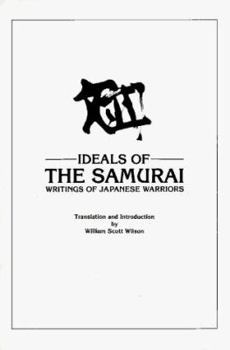Ideals of the Samurai
Select Format
Select Condition 
Book Overview
Compiles the writings of 12 samurai warriors. This anthology paints a cultural picture of feudal Japan between the 13th and 17th centuries. This description may be from another edition of this product.
Format:Paperback
Language:English
ISBN:0897500814
ISBN13:9780897500814
Release Date:August 1982
Publisher:Black Belt Books
Length:144 Pages
Weight:0.44 lbs.
Dimensions:0.3" x 6.0" x 8.9"
Customer Reviews
5 ratings
accessible book
Published by Thriftbooks.com User , 15 years ago
What makes this book stand out is the personal nature of the letters, when you read the texts you really get an impression of each writer, as they write in different styles and with different characteristics. The language used is usually very causal and easy to read, so you don't have to worry about looking up words in a dictionary, it is a very accessible book in other words. What really fascinates me about Samurai philosophy is how individualistic it is, even though they are strongly influenced, to various degrees, by Confucianism, Buddhism and Shintoism. This book really shows the Samurai as individual thinkers and not the robotic stereotypes too often depicted in mainstream movies. If you have read other books translated by Wilson then you probably already know what to expect from this book, the title of the book really speaks for itself. This book is not another Hagakure, as they are written by different people with different views, so don't disregard this book as an alternative version of Hagakure. There are parts in this book that are not so relevant for the person seeking philosophical insights, for example 'how to look after your horse', but for the most part the book is filled with insights. For the person seeking knowledge of Japanese samurai history, this book gives you more information than for example books like 'Hagakure' would, Hagakure: The Book of the Samurai.
A Great Addition to the Bushido Library
Published by Thriftbooks.com User , 16 years ago
I really liked this book. If you are at all interested in the Samurai, wisdom literature, or the warrior lifestyle, you will love this book. I contains teachings from 1198 - 1623 which give insight to how the samurai lived their lives and a look into the ideals which they lived by. My copy is highlighted throughout, as I found the wisdom in these teachings irresistible. If you are into martial arts, Japanese/samurai history and philosophy, or the warrior lifestyle, get this book. You will get a lot out of it. I highly recommend this book. If you read the Ideals of the Samurai, along with Training the Samurai Mind: A Bushido Sourcebook, you should have a good grasp on the ideals and character that makeup the true warrior. These books will give you many ideals to integrate into your own life. Check it out!! Bohdi Sanders, author of Warrior Wisdom: Ageless Wisdom for the Modern Warrior
Twelve Unique Old Translated Writings on Bushido
Published by Thriftbooks.com User , 21 years ago
Translator William Scott Wilson offers us something unique with this book, first published in 1982 by Ohara. I can't recall any other source which includes this many specific writings on bushido (the warrior-gentleman's path)--there are 12 documents in this book, all written by different members of the warrior classes, dating from the 13th century (Hojo Shigetoki's "Message of Master Gokurakuji") to the 17th century (Kuroda Nagamasa's "Notes on Regulations").These writings aren't what many of us 21st century martial artists have been conditioned to expect. I found more homespun advice and common sense relative to the era these men lived in than the stereotypical talk of honor and giri (duty). Much of this advice is still sound today. An example taken from the 700+ year old "Message of Master Gokurakuji" by Hojo Shigatoki:"One should not talk about the faults of others, even as a joke. For even though one may think of it as a joke, to others it may be embarrassing, and this is a bad mistake. If one would joke, he should joke about things that are pleasurable to others. One should have restraint and deep sympathy in all things" (page 42-43)Throughout the course of Wilson's translation, it is clear to see that the Samurai (serving warriors) were a people to whom consideration of others, polite manners and conduct were important. This volume offers a nice change from the linear austerity of the "Hagakure", which for many years along with Musashi's "Book of Five Spheres" has been one of the only widely available books which set the tone for how we modern day folks think of Samurai. In "Ideals of the Samurai", not only are many of the writings centuries apart, but they are from different families and different geographical areas of Japan. If you're curious about how the "old heads" ~really~ lived and what they thought about, this work is a must.
Read the translations and make your own interpretations
Published by Thriftbooks.com User , 22 years ago
Unlike the many books on bushido I have bought, this is a collection of short writings translated with no interpretation, other than an introduction. There are no great descriptions of great battles fought. The passages tend toward the more mundane business of being a feudal lord. Several are 'last statements' which gives you insight as to what the Samurai really wanted to be remembered for. And you will remember the quotable word bites. There are several B & W reproductions of paintings of the authors.
A living Samurai spirit
Published by Thriftbooks.com User , 24 years ago
This wonderful book is a prove that spirit has its reserved place on world history and in the mind of whose want to live a honrable live code. Not a mere historical report but a sensive demonstration of respect by a life-style





